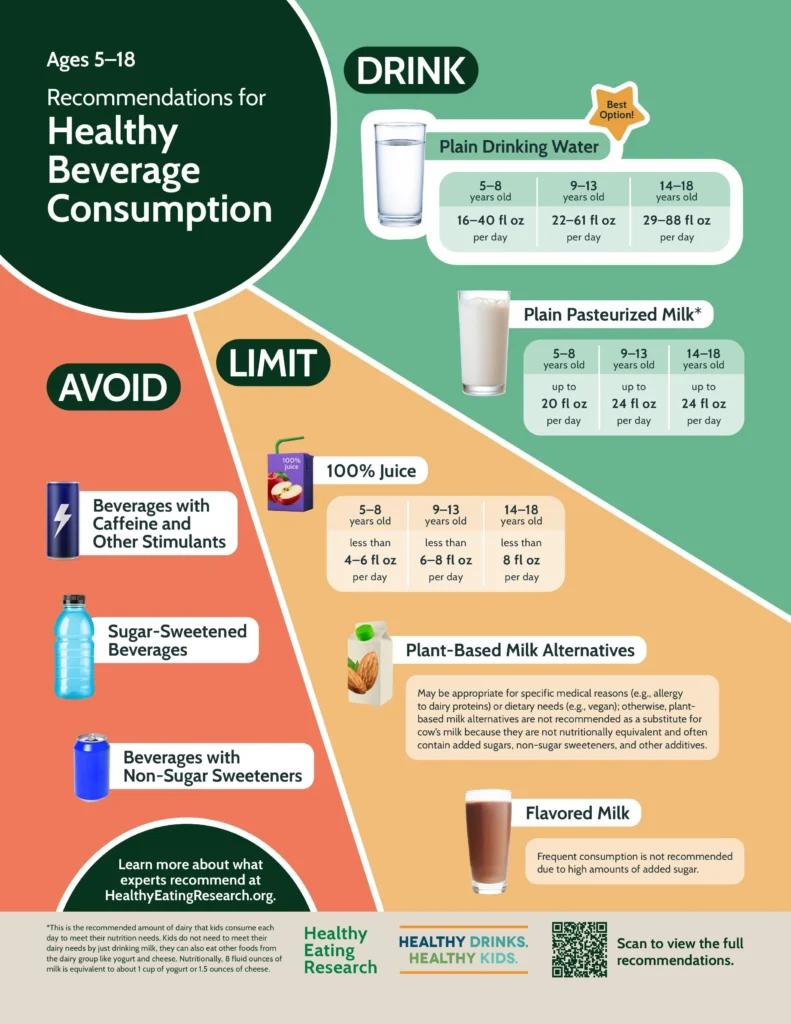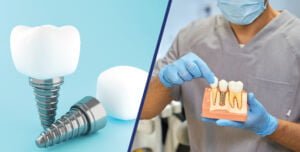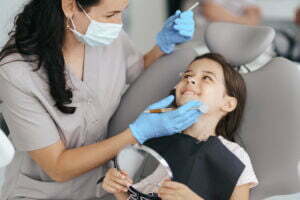

Maintaining good oral health is crucial for children, and one of the most overlooked factors in dental care is the choice of beverages. According to a recent report by leading health organizations, including the American Academy of Pediatric Dentistry (AAPD) and the American Heart Association, what kids drink plays a significant role in their overall health and dental well-being.

Water – The best choice for hydration, water helps rinse away food particles and bacteria, preventing cavities and gum disease.
Plain Pasteurized Milk – Rich in calcium and vitamin D, milk strengthens developing teeth and bones.
Limited 100% Fruit Juice – While natural fruit juices contain vitamins, they should be consumed in moderation due to natural sugars that can contribute to tooth decay. Additionally, offering whole fruit is a great option as it provides fiber and essential nutrients that fruit juice lacks.
As young children grow and develop, their nutritional requirements evolve to support their changing bodies. Nutrition organizations consistently highlight the need for a balanced diet rich in essential vitamins and minerals. Calcium, crucial for strong bones and teeth, is particularly vital during childhood and adolescence.
Similarly, adequate Vitamin D intake is essential for calcium absorption and overall bone health. By understanding these needs, we can prioritize beverages that not only quench thirst but also contribute to their overall well-being. This understanding empowers us to make informed decisions that set the foundation for a healthy lifestyle.
Sugary Drinks (Soda, Sports Drinks, Fruit Punches) – High sugar content contributes to enamel erosion and cavities.
Drinks with Artificial Sweeteners – These beverages may not be as healthy as once believed and can negatively impact long-term health.
Caffeinated Beverages (Coffee, Energy Drinks) – Caffeine can interfere with sleep and overall health while also increasing the risk of enamel wear and staining.
Numerous beverages available today, including sports drinks and soda, are high in added sugars, which can lead to the risk of dental cavities and diet-related conditions such as type 2 diabetes and obesity. Even those with non-sugar sweeteners—such as diet or lite drinks—are not as beneficial as once believed. Recent research suggests they may not effectively aid in weight management and could elevate the risk of chronic diseases like type 2 diabetes and heart disease.
Hydration plays a crucial role for children and teens, impacting both physical activity and cognitive function. Adequate hydration ensures that their bodies can regulate temperature effectively, transport nutrients, and remove waste products efficiently. It is particularly crucial during physical activity, as sweating can lead to fluid loss and impact performance.
Plain water stands out as the ultimate hydration hero. It’s naturally calorie-free, sugar-free, and readily available, making it the ideal choice for quenching thirst throughout the day. This simple yet powerful beverage ensures that young bodies are functioning optimally.
The benefits of adequate hydration extend far beyond physical health. Studies show a strong link between hydration and cognitive performance, with even mild dehydration potentially impacting attention, memory, and mood. Choosing water as a primary beverage can contribute to overall health.
Milk, particularly dairy milk, has long been lauded for its nutritional prowess, providing a rich source of calcium and vitamin D, both essential for bone health. However, with the rise of milk intolerance and alternative dietary preferences, exploring suitable alternatives has become increasingly important.
For individuals with milk intolerance, plant-based alternatives like soy milk offer a comparable nutritional profile to dairy milk. These alternatives are often fortified with calcium, vitamin D, and other essential nutrients, making them a suitable replacement for cow’s milk. Some popular plant-based milk options include:
Soy milk: A good source of protein and often fortified with calcium and vitamin D, making it nutritionally comparable to cow’s milk.
Almond milk: Naturally low in calories and fat, almond milk can be a suitable alternative for those watching their calorie intake.
Oat milk: Known for its creamy texture and slightly sweet flavor, oat milk can be a delicious addition to smoothies and cereals.
Choosing plain milk over flavored varieties, whether dairy or plant-based, is crucial in avoiding added sugars that can negatively impact health. By opting for unsweetened options, we ensure that these beverages remain nutrient-rich without contributing to excess sugar intake.
A pediatric dentist specializes in children’s oral health, ensuring that their developing teeth are well cared for. Regular check-ups with a dentist near you can help detect and prevent issues early on, such as cavities caused by unhealthy beverage choices. At Spark Family Dental, we emphasize preventive care and patient education to set the foundation for a lifetime of healthy smiles.
Encourage Water Over Sugary Drinks – Make water the go-to beverage for your child.
Read Labels Carefully – Avoid drinks with high sugar or artificial sweetener content.
Implement a Brushing and Flossing Routine – Brushing twice a day with fluoride toothpaste and regular flossing helps remove bacteria and prevent decay.
Schedule Regular Dental Visits – Professional cleanings and exams ensure your child’s teeth remain healthy.
Choosing the right beverages is just one step toward ensuring your child’s dental health. Regular visits to a dentist near you play a crucial role in keeping their smile bright and healthy. If you’re looking for a pediatric dentist or need expert advice on dental treatment, Spark Family Dental in Tracy, CA, is here to help!
Contact us today at 209-666-2162 or 209-MYSMILE to schedule an appointment and take the first step toward a lifetime of great oral health for your child.
The AAP recommends that water intake should vary based on age, activity level, and climate. However, ensuring your child has access to plain water throughout the day and encourages them to drink when thirsty is a good starting point. Consulting with your pediatrician can provide tailored guidance on daily water intake for your child.
While dairy is a good source of calcium, excessive milk consumption, like any food or beverage, can contribute to weight gain. Balancing dairy intake with other calcium-rich foods and engaging in regular physical activity are essential. It’s always best to consult with your pediatrician about appropriate portion sizes for your teenager.
Sports drinks are generally not recommended for most children and teens. These beverages are often high in sugar, which can contribute to dental cavities and lead to health issues such as obesity by providing unnecessary calories. Additionally, the artificial sweeteners, caffeine, and high acidity in sports drinks can negatively impact dental health. It’s always a good idea to consult with your dentist, and the American Heart Association (AHA) recommends being cautious about these types of drinks.
In conclusion, ensuring optimal hydration and providing essential nutrients through carefully selected beverages are key to supporting the overall well-being of children and teens. Water remains the ultimate drink for youngsters, while milk and plant-based alternatives offer valuable nutrients. Remember, moderation is crucial, and balance is key when guiding the beverage choices for young individuals. For more personalized recommendations on promoting healthy hydration habits and nutritional intake for your child or teen, don’t hesitate to reach out to our team of experts for professional and approachable guidance.
The full recommendations and accompanying technical report can be found at healthyeatingresearch.org.





Spark Family Dental is a Tracy-based local dentist providing quality care tailored to your needs. With experienced professionals and the latest technology, we can ensure you receive the best dental services possible. We accept PPO, and offer flexible payment plans through CareCredit.